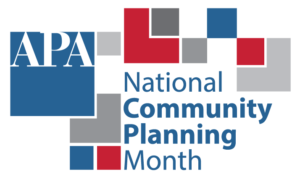October is National Community Planning Month

Join us in October for activities that explore how planning benefits the community and helps make Gorham awesome!
October is National Community Planning Month. Planning is the process of envisioning, mapping, or otherwise conceiving of how a community will look, grow, and define itself, and much of what makes Gorham, Maine a special place has been the result of decades of careful planning. From where you live, to how you commute, to the type of home you live in, planning helps shape the community around us.
Did you know Gorham has many different plans? Thank you for your help in creating all of them! We couldn’t do it without you.
Ask The Planners Day
Please join us for sweet treats on October 12th, 2023, between 9:00am and 3:00pm, to ask the planners about the plans Gorham has in place.
We have a long history of community planning. Check out our planning history, here.
Ways to participate in Community Planning Month
- Ask the Planners Day! October 12th 9am - 3pm
- Scavenger Hunt
- BINGO
- Crossword Puzzle
- Word Search
Submit games and puzzles with name, email and phone number to the Planning Office to enter to win one of two gift bags!
Library Must Reads
Stop by the Baxter Memorial Library for the following planning must reads and great suggestions for your book club!
- A Better Way to Zone by Donald Elliott
- Changing Maine by Richard Barringer
- Conservation Design for Subdivision by Randall Arendt
- Design with Nature by Ian L. McHarg
- Economic Development: What Works on the Local Level, National League of Cities
- Growing Greener by Randall Arendt
- Local Planning: Contemporary Principles and Practice edited by Gary Hack, et al.
- Nature Friendly Ordinances by James McElfish, Jr.
- People Habitat by F. Kaid Benfield
- Planners on Planning by Bruce McClendon and Anthony Catanese
- Rural by Design by Randall Arendt
- Silent Spring by Rachel Carson
- Smarter Land Use by Karl Kehde
- The Death and Life of Great American Cities by Jane Jacobs
- The Geography of Nowhere: The Rise and Decline of America’s Man-Made Landscape by James Howard Kunstler
- The Next American Metropolis: Ecology, Community, and the American Dream by Peter Calthorpe
- The Small Town Planning Handbook by Daniels, Keller and Lapping
- The Smart Growth Manual by Duany, Speck Lydon
- Walkable City by Jeff Speck
For Kids
- What do people do all day? By Richard Scarry
- Metropolis by Benoit Tardif
Want more? Take a look at the following links…
- American Planning Association - The APA is the membership association for professional planners; the most authoritative source of planning information on the web.
- Northern New England Chapter of the American Planning Association (NNECAPA) – NNECAPA is the regional chapter of the American Planning Association that includes Maine, New Hampshire, and Vermont
- Maine Association of Planners - The Maine Association of Planners (MAP) is part of the Northern New England Chapter of the American Planning Association. It consists of over 100 members working in Planning and closely related professions in Maine.
- Congress for the New Urbanism - The most prominent and respected advocate for The New Urbanism; the website is a comprehensive resource for all things related to New Urbanism.
- National Association of Home Builders - The voice of America's housing industry, with a federation of more than 800 state and local builders associations.
- Metropolis Magazine - The online version of Metropolis Magazine, which examines contemporary life through design, architecture, interior design, planning, and preservation.
- PlannersWeb - Home to the Planning Commissioner's Journal, a respected newsletter for planning commissioners and citizen planners.
- Strong Towns – Strong Towns is a nonprofit advocacy organization that provides accessible content that analyzes the failures of the post-war North American development pattern while giving citizens the knowledge and tools to start making our places better today.
- GrowSmart Maine – This organization provides resources for creation of a more sustainable and livable development pattern for Maine communities that seeks to prevent and alleviate “sprawl” development.
